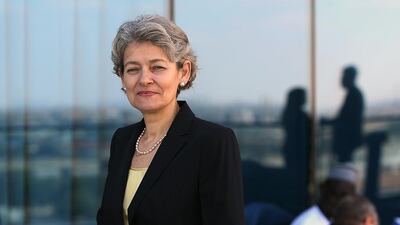DUBAI // Government and religious leaders worldwide have been urged to build and support national policies that promote gender equality in education.
“It’s critical to have the right political commitment,” Irina Bokova, head of Unesco, the United Nations education agency, told a conference in Dubai.
“Messages from political leaders are very important. In some cases we have to work with traditional leaders. In some cases we also need the religious leaders on our side to pass the right messages. Those messages should say that nothing in this traditional belief says that women should not be educated.”
Gender parity and equality is one of the six goals in Unesco’s Education for All 2015 initiative. Women still represent two-thirds of the world’s 774 million illiterate adults.
“This is a waste of talent and human ingenuity that no society can afford,” the Unesco director general said. “No society can develop sustainability using just 50 per cent of its human capital.”
In the Arab States in 2011, there were 92 girls for every 100 boys in primary school and 93 in secondary school, compared with 87 and 88 in 1999. The global average is 97 in primary school and 98 in secondary school.
“There is progress, but compared to the global average, the Arab region is still lagging behind,” Ms Bokova said.
Unesco defines the 22 Arab States as the UAE, Algeria, Bahrain, Djibouti, Egypt, Iraq, Jordan, Kuwait, Lebanon, Libya, Malta, Mauritania, Morocco, Oman, Palestine, Qatar, Saudi Arabia, Somalia, Sudan, Syria, Tunisia and Yemen.
High rates of illiteracy are also a problem in many of these countries, where 48 million people are illiterate. “Two out of three are women,” Ms Bokova said at the Global Education and Skills Forum in Dubai.
“This conference, what we want to achieve is to see a very strong commitment to education in terms of putting it on the global political agenda.
“We want to see a very vital, vibrant debate and we are seeing it … about the quality of education and the quality of learning.”
Ms Bokova encouraged private investment and public and private partnerships in achieving gender equality and quality education. She also urged business leaders to join Unesco’s Global Partnership for Girls’ Education, which targets transition from secondary education and literacy.
rpennington@thenational.ae

